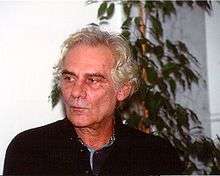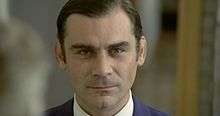Gian Maria Volontè
| Gian Maria Volontè | |
|---|---|
 Gian Maria Volontè in his later years | |
| Born |
9 April 1933 Milan, Italy |
| Died |
6 December 1994 (aged 61) Florina, Greece |
| Other names | John Wells, Johnny Wels |
| Occupation | Actor |
| Years active | 1957–1993 |
| Spouse(s) | Armenia Balducci |
| Partner(s) |
Carla Gravina Angelica Ippolito (1977-his death) |
| Children | Mauriel Morejon |
| Relatives | Claudio Camaso (brother) |
Gian Maria Volontè (9 April 1933 – 6 December 1994) was an Italian actor, remembered for his outspoken left-wing leanings and fiery temper on and off-screen. He is perhaps most famous outside of Italy for his roles in four Spaghetti Western films: Ramon Rojo and El Indio in Sergio Leone's A Fistful of Dollars (1965) and For a Few Dollars More (1965), El Chuncho Munoz in Damiano Damiani's A Bullet for the General (1966) and Professor Brad Fletcher in Sergio Sollima's Face to Face (1967).
In Italy and much of Europe, he was notable for his roles in high-profile social dramas depicting the political and social stirrings of Italian and European society in the 1960s and 1970s, including four films directed by Elio Petri - We Still Kill the Old Way (1967), Investigation of a Citizen Above Suspicion (1971), The Working Class Goes to Heaven (1971) and Todo modo (1976). He is also recognized for his performance in Jean-Pierre Melville's Le Cercle Rouge (1970).
Early life
Volontè was born in Milan, and went to Rome to train for an acting career at the Accademia Nazionale di Arte Drammatica Silvio D'Amico, which he left in 1957. He had a brief career in television and acting in Shakespeare and Goldoni plays on the stage, before establishing his film career.
Career
Volontè made his debut in 1960 in Sotto dieci bandiere, directed by Duilio Coletti. Just four years later, he played "Ramón Rojo" in A Fistful of Dollars (1964), and "El Indio" in For a Few Dollars More (1965), both for cash reasons as he did not consider either role serious. Both films were directed by the then-unknown Sergio Leone, and Volontè's roles in them would bring him his greatest recognition from American audiences. He played Carlo Levi in Cristo si é fermato a Eboli (1979), which was based on Levi's autobiographical account of his years in internal-exile in Italy in the 1930s. The English title is Christ Stopped at Eboli. Volontè played the memorable role of the Bandito-turned-guerrilla, El Chucho, in A Bullet for the General (1966).
Volontè's performances as memorable but neurotic characters, or as a gifted leader of brigands or revolutionaries, together with the unexpected, worldwide success of the films, gave him international fame. Volontè had already played comedies, including A cavallo della tigre (1961), by Luigi Comencini, and confirmed his versatility in L'armata Brancaleone (1966). However, he found his main dimension in dramatic roles for Banditi a Milano (1968), by Carlo Lizzani, Sbatti il mostro in prima pagina (1972) by Marco Bellocchio, La Classe operaia va in paradiso (1972) by his friend Elio Petri and Il sospetto (1975) by Francesco Maselli.
In 1968, Volontè won a Silver Ribbon as best actor for A ciascuno il suo, also directed by Elio Petri. Volonté received the same award for two other performances: Petri's Indagine su un cittadino al di sopra di ogni sospetto (1971, winner of an Academy Award as best foreign film), considered by many to be his finest; and in The Abyss (1989).
In 1983 he won the award for Best Actor at the 1983 Cannes Film Festival for La Mort de Mario Ricci. Four years later, at the 37th Berlin International Film Festival, he won the Silver Bear for Best Actor for Il caso Moro.[1] 1988 Cannes Film Festival Official Selection, remarkable play as a Renaissance physician in The Abyss by André Delvaux from Marguerite Yourcenar's famous novel. In 1990, Volontè was named Best European Actor for Porte aperte. In 1991, at the Venice Film Festival, he won a Golden Lion for his career as a whole. Volontè played numerous roles outside Italy.
Personal life
Volontè was a strong political activist and known for his pro-Communist leanings. In 1981, he helped terrorist Oreste Scalzone to flee from capture in Italy to Denmark.[2]He was the partner of of Italian actress Carla Gravina for almost 10 years after they met when they played Romeo and Juliet in a theatre production in 1960. The two had a daughter Giovanna, born in the early 1960s. Actress Angelica Ippolito was his companion from 1977 until his death in 1994.
Death
Volontè died from a heart attack in 1994 at Florina, Greece, during the filming of Ulysses' Gaze, directed by Theo Angelopoulos. Actor Erland Josephson replaced him in the role. Volontè's resting place is a small cemetery on the Sardinian island of Isola della Maddalena.
Selected filmography

- Under Ten Flags (1960, directed by Duilio Coletti)
- L'Atlantide (1961, directed by Edgar G. Ulmer)
- Hercules and the Conquest of Atlantis (1961, directed by Vittorio Cottafavi)
- The Four Days of Naples (1962, directed by Nanni Loy)
- A Man for Burning (1962, directed by Paolo and Vittorio Taviani and Valentino Orsini)
- Il terrorista (1963, directed by Gianfranco De Bosio)
- A Fistful of Dollars (credited as "Johnny Wels") (1964, directed by Sergio Leone)
- For a Few Dollars More (1965, directed by Sergio Leone)
- L'armata Brancaleone (1966, directed by Mario Monicelli)
- A Bullet for the General (1966, directed by Damiano Damiani)
- A Gangstergirl (1966, directed by Frans Weisz)
- Wake Up and Die (1966, directed by Carlo Lizzani)
- Faccia a faccia (1967, directed by Sergio Sollima)
- We Still Kill the Old Way (1967, directed by Elio Petri)
- Bandits in Milan (1968, directed by Carlo Lizzani)
- Summit (1968, directed by Giorgio Bontempi)
- Under the Sign of Scorpio (1969, directed by Paolo and Vittorio Taviani)
- The Bandit (1969, directed by Carlo Lizzani)
- Investigation of a Citizen Above Suspicion (1970, directed by Elio Petri)
- Le Vent d'est (1970, directed by Jean-Luc Godard and the Dziga Vertov Group)
- Many Wars Ago (1970, directed by Francesco Rosi)
- Le Cercle rouge (1970, directed by Jean-Pierre Melville)
- Sacco e Vanzetti (1971, directed by Giuliano Montaldo)
- Plot (1972, directed by Yves Boisset)
- Sbatti il mostro in prima pagina (1972, directed by Marco Bellocchio)
- The Working Class Goes to Heaven (1972, directed by Elio Petri)
- The Mattei Affair (1972, directed by Francesco Rosi)
- Lucky Luciano (1973, directed by Francesco Rosi)
- Giordano Bruno (1973, directed by Giuliano Montaldo)
- Todo modo (1976, directed by Elio Petri)
- Letters from Marusia (1976, directed by Miguel Littín)
- Io ho paura (1978, directed by Damiano Damiani)
- Christ Stopped at Eboli (1979, directed by Francesco Rosi)
- Ogro (1979, directed by Gillo Pontecorvo)
- The Lady of the Camellias (1981, directed by Mauro Bolognini)
- La Certosa di Parma (1982, TV miniseries, directed by Mauro Bolognini)
- La Mort de Mario Ricci (1983, directed by Claude Goretta)
- Il caso Moro (1986, directed by Giuseppe Ferrara)
- Chronicle of a Death Foretold (1987, directed by Francesco Rosi)
- Un ragazzo di Calabria (1987, directed by Luigi Comencini)
- The Abyss (1988, directed by André Delvaux)
- Pestalozzi's Mountain (1989, directed by Peter von Gunten)
- Tre colonne in cronaca (1990, directed by Carlo Vanzina)
- Open Doors (1990, directed by Gianni Amelio)
- Funes, a Great Love (1993, directed by Raúl de la Torre)
References
- ↑ "Berlinale: 1987 Prize Winners". berlinale.de. Retrieved 27 February 2011.
- ↑ "SCALZONE: ' MI FECE SCAPPARE DALL' ITALIA'". La Repubblica. 7 December 1994. Retrieved 12 January 2011.
External links
| Wikimedia Commons has media related to Gian Maria Volontè. |